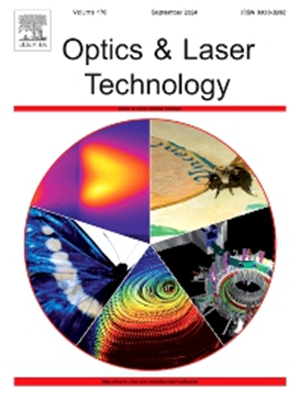Rapid in-situ accuracy evaluation and exposure optimization method for fringe projection profilometry
IF 4.6
2区 物理与天体物理
Q1 OPTICS
引用次数: 0
Abstract
Fringe projection profilometry (FPP) has become one of the most powerful techniques for three-dimensional (3D) non-contact measurement. However, in practical scenarios, the various reflectivity of the unknown measured objects often greatly makes the system unable to achieve the theoretical precision under the same system parameter settings. Therefore, the adaptively system parameter setting is essential to be developed. In this paper, we propose a novel metric model, i.e. the accuracy quality function, for initial accuracy evaluation using in-situ acquired images under the current parameter settings. The causes that potentially affects the ultimate accuracy are analyzed via theoretical derivation and further adopted within the evaluation model. In addition, an optimal exposure selection method based just two images is carried out to fast adjusting. Experimental results demonstrated that the proposed accuracy quality model aligns well with the actual condition. Under optimal exposure, it achieved a significant reduction in phase error by 36.15% and by 21.39% in low- and high- exposure, highlighting its strong performance and potential for high-accuracy and in-situ 3D shape measurement applications.
条纹投影轮廓测量法的快速原位精度评估和曝光优化方法
边缘投影轮廓仪(FPP)已成为最强大的三维(3D)非接触测量技术之一。然而,在实际应用中,由于未知测量对象的反射率各不相同,在相同的系统参数设置下,系统往往无法达到理论精度。因此,自适应的系统参数设置就显得尤为重要。在本文中,我们提出了一种新的度量模型,即精度质量函数,用于在当前参数设置下使用原位获取的图像进行初始精度评估。通过理论推导分析了可能影响最终精度的原因,并在评估模型中进一步采用。此外,还采用了一种基于两幅图像的最佳曝光选择方法来进行快速调整。实验结果表明,所提出的精度质量模型与实际情况非常吻合。在最佳曝光条件下,相位误差显著降低了 36.15%,在低曝光和高曝光条件下,相位误差降低了 21.39%,凸显了其在高精度和原位三维形状测量应用中的强大性能和潜力。
本文章由计算机程序翻译,如有差异,请以英文原文为准。
求助全文
约1分钟内获得全文
求助全文
来源期刊
CiteScore
8.50
自引率
10.00%
发文量
1060
审稿时长
3.4 months
期刊介绍:
Optics & Laser Technology aims to provide a vehicle for the publication of a broad range of high quality research and review papers in those fields of scientific and engineering research appertaining to the development and application of the technology of optics and lasers. Papers describing original work in these areas are submitted to rigorous refereeing prior to acceptance for publication.
The scope of Optics & Laser Technology encompasses, but is not restricted to, the following areas:
•development in all types of lasers
•developments in optoelectronic devices and photonics
•developments in new photonics and optical concepts
•developments in conventional optics, optical instruments and components
•techniques of optical metrology, including interferometry and optical fibre sensors
•LIDAR and other non-contact optical measurement techniques, including optical methods in heat and fluid flow
•applications of lasers to materials processing, optical NDT display (including holography) and optical communication
•research and development in the field of laser safety including studies of hazards resulting from the applications of lasers (laser safety, hazards of laser fume)
•developments in optical computing and optical information processing
•developments in new optical materials
•developments in new optical characterization methods and techniques
•developments in quantum optics
•developments in light assisted micro and nanofabrication methods and techniques
•developments in nanophotonics and biophotonics
•developments in imaging processing and systems

 求助内容:
求助内容: 应助结果提醒方式:
应助结果提醒方式:


